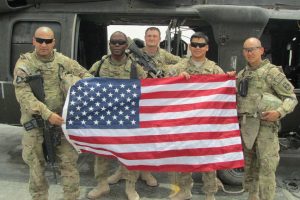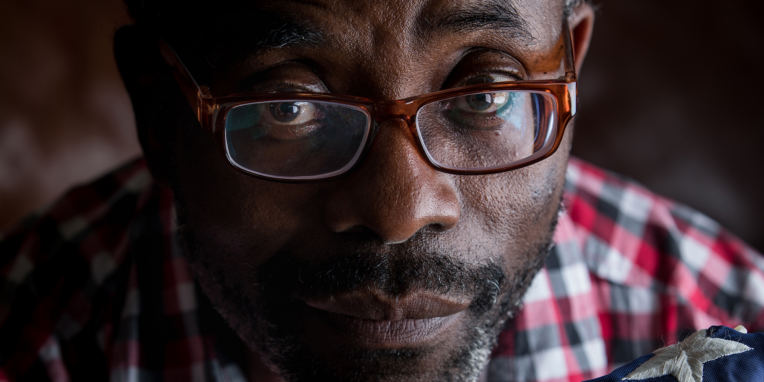Col. David Rabb ’83 is an expert in the hell that is war.
He has spent his life in service to the nation, first as a United States Marine and later as a soldier in the U.S. Army. He served in a number of positions in his distinguished 41-year military career that began when he enlisted at age 17.
His personal sacrifices have been great as a result of deployments to both Iraq and Afghanistan, where he served as commander of the 113th Medical Detachment, Combat Stress Control. He suffers from post-tramatic stress disorder (PTSD), and traumatic brain injury, due to close proximity to numerous bomb blasts.
And yet, Rabb’s focus is not on his struggles. He instead lives to help others overcome their own scars—physical and emotional—that are an inevitable part of military combat duty.
Appears InRabb, 60, endures residual pain from injuries to his back, shoulders, and knees as a result of carrying loads of equipment over the years in war zones. He also continues working to overcome a stroke he suffered stateside in 2015 after his tours ended, which resulted in partial blindness in one eye.
From 2009 to 2011, he coordinated the mental health care for 40,000 reserve soldiers across seven states as director of Psychological Health for the 63rd Regional Support Command in Mountain View, California.
With the help of his wife, Kim, he worked to convince the Veterans Administration (VA) and the Department of Defense to formally recognize the invisible wounds caused by war and have “moral injury” designated as a disability. This set precedence for all veterans who suffer from moral injury to have it included in their medical records.
The VA’s National Center for PTSD describes moral injury as similar to psychological trauma with a key component “an act of transgression, which shatters moral and ethical expectations that are rooted in religious or spiritual beliefs.”
In the context of war, the VA now describes moral injury as direct participation in acts of combat that kill or harm, witnessing death and dying, or failing to prevent immoral acts, all of which can be perceived by the individual as “gross moral violations.”
The best therapists—in my belief system—are those who’ve been wounded, who have been touched by trauma
Rabb describes moral injury as “an injury to the soul.” He sees his own pain as preparing him to help his military brothers and sisters heal. “The best therapists—in my belief system—are those who’ve been wounded, who have been touched by trauma,” he said.
He prepared for his calling as counselor by enrolling at Illinois State University after six years of service, majoring in criminal justice sciences. While at ISU, Rabb was elected president of the Black Student Union and served on the Academic Senate. He was also an on-air personality at WZND.

A native of Illinois, Rabb went on to finish a master’s degree in social work at the University of Chicago before returning to the military as an officer in the U.S. Army Reserves. He concurrently served 34 years with the VA as a social worker. His specialty was looking after the mental health of combat soldiers and Marines.
They readily embrace Rabb, appreciating how his own military experience empowers him to know how returning from war is one of the great challenges for anyone serving in combat zones.
“When I came back from Iraq, things disintegrated, mostly my fault. I was a wounded warrior walking around. I was disoriented,” Rabb said. He blames his post-war struggles for the end of his first marriage. “It lasted 20 years, and then I went to war.”
Rabb directs anyone seeking to understand veterans to the 2017 mini-series titled The Long Road Home. Produced by National Geographic, it’s based on journalist Martha Raddatz’s best-selling book of the same name. The book and film tell the story of a platoon being ambushed in Sadr City in Baghdad on April 4, 2004. The date became known as “Black Sunday.”
Rabb describes it as “the first major insurgency in this war on terror.” In a 24-hour period, eight soldiers were killed, and about 70 were wounded. Rabb knows because he was there. Recalling it as the pivotal moment of his career, he knows it changed him forever.
“My company of 85 soldiers covered the entire Iraq Theater,” he said. “We thought the war was over, but it wasn’t.” The mission shifted quickly, and he had to figure out how to cover such a large territory.
“For some reason, of all the people in the world, God had me in that mix,” he said. “It was a critical event, a lot of death and destruction. As a leader, as a senior officer, and also as a healer, it was very traumatic. But I had a mission to provide neuro-psychiatric triage, behavioral health, grief and loss counseling, stress management, and bereavement counseling.”

Rabb remembers taking care of soldiers in Baghdad who were, as he described them, “catatonic, high anxiety.” His was a high-stakes job on a daily basis, regardless of where he was stationed. He counts as his greatest accomplishment the fact that no one from his unit died. “I’m very proud to be part of that, and to have lived through it.”
During Rabb’s command of the 113th Medical Detachment, the unit made more than 72,000 behavioral health contacts. In addition, he advocated successfully for the 113th to get the first Army Reserve therapy dog, Zeke. A black Labrador Retriever, Zeke has assisted in more than 7,000 contacts with service members.
For about a year now, Rabb has had his own therapy dog, a yellow lab he calls Gunny Quail. He hopes to use his dog for outreach to others. “He knows about 80 commands. He notices when I’m stressed and calms me down,” Rabb said of his K9 partner, the first warrior dog in Minnesota. Rabb lives in St. Paul with Kim and their two daughters—Leietta, 17, and Alyse, 16. He also has four adult children.
Rabb was honored to be one of artist Matt Mitchell’s 100 Faces of War project, for which each subject’s portrait was painted. The 100 were chosen to be representative of the 2.5 million people deployed to Iraq and Afghanistan between 2001 and 2014. They represent a cross section of those who served in terms of gender, race, branch of service or rank—from officers to the enlisted and civilians. The fallen are also represented.
Along with his portrait are Rabb’s own words: “As a leader and mental health clinician in Iraq, I quickly learned that Soldiers and Marines healed quicker and better in communities. In well-led units, there is a strong sense of bonding, cohesion, and esprit de corps—a sense of community. Isolation is unhealthy. Isolation, like complacency, kills.”
Rabb knows this to be true from what he has witnessed away from the combat zone as well. In 2009, he was a subject matter expert following the Fort Hood shooting that left 13 dead. He has been called on to share his clinical expertise by leading seminars and training clinicians, chaplains, and more than 200 civilians and federal employees on how to help combat survivors cope with the aftermath of traumatic events.
He was the U.S. Army Western Region Medical Command Care and Transition Coordinator, and worked at the VA’s Palo Alto Health Care System/Polytrauma Center. Now retired, his career culminated with his position as the VA’s national director of diversity and inclusion in Washington, D.C.
Rabb is quick to point out that he’s “not out of the game” despite opting for retirement.
Even as he works at his own healing, he ponders new ways he can lead. He’s thinking about creating a nonprofit focused on education, training, and consultation.
Such objectives fit with Rabb’s life philosophy, which is the need to always plan ahead and prepare for what’s next. It helps him with a daily routine of speech therapy, rehab appointments and relearning some of life’s basics, such as how to drive. All are necessary following the stroke.
See The Full Volume
This article is from Illinois State Volume 19, Number 3, November 2018.
Discover more
“You gotta have goals,” Rabb said. He focuses on an acronym—GROW—which stands for “Goals, without them you’re going nowhere. Reach, reach for it; put forth the effort. Opportunities, billions of them around you. Work. You can’t get out of this by wishing upon a star; you can’t get out of this without work. Appreciate the work.”
It’s apparent that Rabb follows his own advice. He is a positive, upbeat person whose conversation is thoughtful, confident, and punctuated with words that sound both like a military man and a minister.
“As you were,” he is likely to say when he has misspoken and is correcting himself.
“God is good,” is another frequent phrase injected as he tells his life story.
A creative person, Rabb wrote a children’s book, From A to Z: What a Veteran Means to Me. He found inspiration for the project after speaking to a classroom where the children struggled to define the meaning tied to the word veteran.
Poetry inspires Rabb, who is fond of lines written by Octavia Butler in her book Parable of the Sower: “All that you touch you change. All that you change, changes you. The only lasting truth is change. God is change.”
He sees parallels to his own life in those words.
“I was able to take all that creativity that God has given me and use it to change other people’s lives,” said Rabb, who remains a collector of quotes, a reader, a thinker, and a writer of poetry.
A line from one of his poems shows the complexities of his experiences: “Off centered and confused in the direction I should take, I sometimes wonder if my faith will keep me afloat … out of the ashes, I come. Moved by the loving kindness that surrounds me, hoping it will soothe the hurt and anger within me … out of the ashes, I come.”
Editor’s note: Illinois State is ranked in the top 100 universities in College Factual’s 2018 Best Schools for Veterans in the U.S. ISU provides student veterans with academic, advisement and financial support through the Veterans and Military Services Office. It assists with Veterans Administration education benefits, helps student veterans transition into life on campus, and provides referrals to other veteran services within the community. Call (309) 438-2207 or email Veterans@IllinoisState.edu.
John Moody can be reached at jemoody2@IllinoisState.edu.


